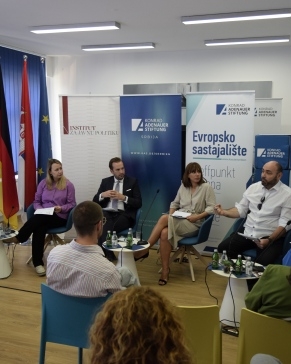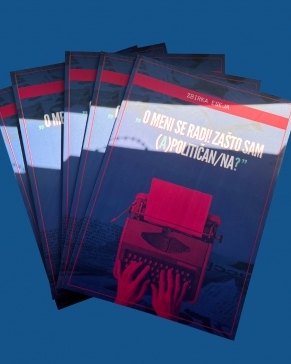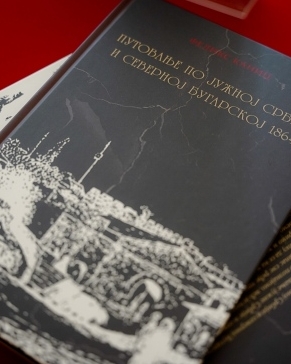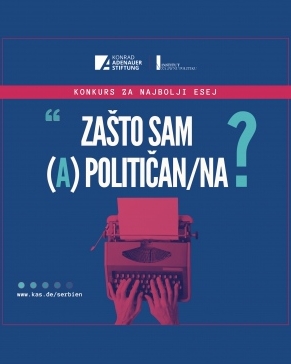
The Western Balkan countries didn't even properly fit within the main trends of the Second Technological (Technical) Revolution when the predominance of geopolitics, almost overnight, got replaced by the supremacy of the new form of organizing reality – chronopolitics. Back in the late sixties of the last century, French theorists Jean-Jacques Servan-Schreiber and Paul Virilio have indicated in their works the beginnings of what would later be called the New World Order, or – somewhat later (and much more accurate) – globalization. A key feature of the new strategy of the great powers was a complete loss of interest in territorial gains, driven by the need for raw materials and expanding markets. Although it became common to say that no one had ever learned anything from history, the bad experiences of two devastating world wars and – perhaps even more important factor – the rapid rise of information technologies have played a crucial role in changing the way the reality is perceived. The radical change of political, military and economic psychology started with the obvious facts which were neglected for centuries, primarily with the fact that the resources of the territories are, so to say, invariable and eternal, while the resources of time are limited and are constantly crumbling. At the beginning of the nineties of the last century, psychology of engineers and traders has definitely defeated the psychology of warriors. From then onwards wars, either won or lost, are a double loss for traders and manufacturers – loss of laborers and potential customers, while – on the other hand – the control of occupied territories is both expensive and inefficient. It has been realized – finally – that the control of time through the telebroadcasting of military, stock market and information technologies in real-time isfar more efficient than the paleotechnic control of borders and territories. The omnipresence and the speed of new technologies have turned the entire planet in a single market, while the production operations and primary processing of cheap raw materials – which used to make both the capitalist West and the socialist East equally proud – are now left to the underdeveloped, third world countries.
An unpleasant question needs to be asked here: why have some nations of the former Yugoslavia – a country that belonged to the upper class of advanced, second world states – decided to return to paleotechnic and paleohistoric time rather than to enter the new world history trends at the dawn of a new epoch. Since the whole nation cannot be blamed – if for no other reason, then because the nation is a mere ideological construct – the responsibility for historical regression falls on the so-called national elites, tragically lagged behind the intellectual trends of the modern world. Local pseudo-elites, consisting mainly of inert spirits obsessed with visions of collective problem solving – was that collective class or nation, whatever – have just not been able to grasp the complexity of the coming changes. Afraid of (at the first glance) terrifying future and processes that they could not understand, ex-Yugoslav political and cultural elites (excluding Slovenian) could not, in a state of panic, think of anything better than yet another review of the past and yet another adventure of solving the territorial conquests and border lines which was, as we have already said, completely irrelevant for the new circumstances. In a time of accelerated erasure of European borders and previously unseen freedom of movement of people, goods and capital, anachronistic projects for violent establishing of ethnically pure states were started in the former Yugoslavia.
The absurdity of such projects is enhanced by the absolute absence of any rational motivation for the war – better not even mention the economic one – other than the alleged collective wish for all the members of the Serbian or Croatian nation to live in one state, based on the fictional "historical right." While most of the world was dealing with redefining its position in the new order of things, Serbian pseudo-elites amused themselves by redrawing the medieval geography of the Balkan Peninsula. At that time, in several of his articles, Zoran Djindjic warned (in vain) of the complete failure of such politics in which "(...) the most important for Serbia is to exist," and which – based on the fact of existence – expects that all of its problems will be solved and that all of its desires will be unconditionally fulfilled. The extent of insanity of the nationalistic project can be perfectly illustrated with the fact (which is supported by the exact figures) that within the maximized borders of the so-called Great Serbia Serbs would actually be a minority. The dominant tendencies of Serbian politics of the nineties – against which the opposition (also mainly nationalistic) fought more or less unsuccessfully and unconvincingly – was not, strictly speaking, the politics in the real, nineteenth-century sense of the word, but quite superficially politicized tribal ethos grounded in the most primitive understanding of the community, according to which the individual unites the entire tribe, while fully integrating their individuality in the tribal unity. In Serbia of the early nineties, the best (or even the only) value was to be a Serb.
It is self-evident that such an upside-down, premodern understanding of the nation and the state led to the collapse of all the values; hence, it is logical that in such a dysfunctional system, hand in hand, in the same line and fully equal stood high communist apparatchik Milosevic and an international criminal Zeljko Raznatovic-Arkan, academics Cosic and Beckovic and street smugglers of gasoline and cigarettes, doctor of juridical science Kostunica, and folk singer, Arkan's wife, Ceca Raznatovic. Such "conciliarity" is only a visible manifestation of an essential erasure of all the differences between politics, crime and entertainment. Serbian tribalism – as the most organized and the most powerful one – through a system of connected vessels spilled over to the neighboring countries, also latently inclined to tribalism, which resulted in the paralysis of the entire region and disruption of communication, which had hopelessly provincialized newly created statelets.
Irrespective of the inevitable (but superficial) acceptance of advanced technologies, all the statelets are technologically and culturally more distant from the current trends in world history than they were as the non-sovereign, federal units of the former Yugoslavia.
Now is the time to ask the key questions: does this have to remain so forever, and is it possible to catch up with the rest of the world? With the kind of political elites dominant in Serbia, Croatia and Bosnia and Herzegovina this would be possible simply because the aforementioned elites (at least majority of them) perceive the modernization of the state and the emancipation of citizens as a risk of losing the national identities (and they create such media presentation for the environment). If we leave aside for a moment the absurdity of the existence of some kind of collective identities – which should not be confused with the realities of national styles and national traditions – if we tentatively accept their existence, we will soon realize that all these so-called collective identities are based on a denial of reality, negations, highlights of differences and resentment of territories lost. The local elites find these things very useful for the mass mobilization of the masses, although this "mobilization" in fact only produces its opposite - the overall inertia and breakdown of the social cohesion.
I would say at the end that in all the countries formed after the disintegration of Yugoslavia, at this time – thanks to the openness of information technologies which prevents self-isolation – there is a critical mass of intellectuals ready to face the challenges of more and more complicated global reality, to find a place for themselves in this reality and - consequently – to find a place for their states as well. If they receive support from the more emancipated parts of local political elites, the big work of stabilizing the psychologies - the only essential instability of the region - could be done, and in a relatively short period of time.




